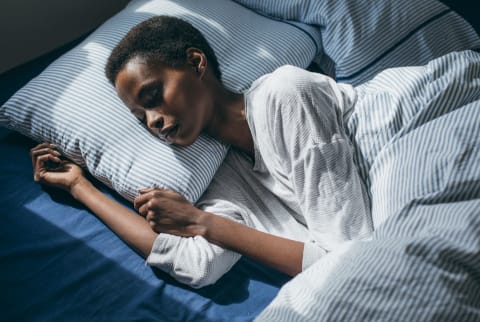
Image by PeopleImages / iStock
April 14, 2023
Our editors have independently chosen the products listed on this page. If you purchase something mentioned in this article, we may
Just a few hours of poor sleep are enough to kick off a stressful spiral. At least in my experience, putting too much pressure on yourself to “make up for it” the next night only makes things worse. But when it comes to sleep, nobody’s perfect. Even sleep doctors who spend day in and day out helping clients rest can struggle to snooze themselves from time to time. But they know how to take bad sleep in stride and keep it from becoming a pattern.
Here, sleep experts share the mindset shifts, nightly habits, and supportive tools that help them bounce back after the occasional restless night.
Advertisement
This ad is displayed using third party content and we do not control its accessibility features.
1.
They accept that some things are out of their control.
Clinical psychologist and sleep doctor Michael J. Breus, Ph.D. sticks to a pretty strict nightly routine (that you can read all about here). But even after diligently meditating, turning off electronics, and doing his gratitude practice, sometimes he still finds himself awake late into the night.
“I can do literally everything correctly, and I still may not get a great night’s sleep based on factors beyond my control,” Breus writes on mindbodygreen. “For me, having a general understanding that every night is not going to be perfect will lower any anxiety or pressure I put on myself (which of course would have prevented me from sleeping anyway!). So I follow my disciplined routine, and when or if it doesn’t work, I accept it and move on.”
2.
They zoom out to look at weekly averages.
Shelby Harris, PsyD, DBSM, clinical psychologist and sleep specialist, like every human being on this Earth, will occasionally be kept awake by one thing or another. Instead of seeing restless nights as failures, Harris shares that she tries to put them in the context of her broader sleep habits. “I aim for five nights a week (at least) where I’m content with my sleep, which helps reduce the idea of perfection. If I get those five nights a week of good sleep, I’m happy.”
Advertisement
This ad is displayed using third party content and we do not control its accessibility features.
3.
They recruit help to get back on track.
After a night of poor sleep, experts double down on good nighttime habits like eating an early dinner, avoiding sugar and alcohol, and doing relaxing activities before bed. Some also use sleep supplements as another way to wind down from the day.
mindbodygreen’s sleep support+ is a favorite among health professionals because of its safe, functional ingredients: magnesium bisglycinate, jujube, and PharmaGABA®. These work in tandem to quiet the mind and create a noticeable sense of relaxation before bed, laddering up to deeper and more restorative sleep.*
“Since I started taking sleep support+ a few months ago, my deep sleep—which is the most important part of our sleep cycle—has increased in duration, I fall asleep faster, and I have been waking up feeling so much more refreshed,”* says Heather Moday, MD. “I am very caffeine- and blue-light-sensitive and used to take melatonin at night but found that it often did not work. mindbodygreen’s natural, gentle sleep support+ formula has effectively solved my sleep issues,”* says Amy Shah, M.D.
To learn more about the supplement that experts (and everyday people) are using for infinitely better sleep quality, head here.
Advertisement
This ad is displayed using third party content and we do not control its accessibility features.
4.
They have a backup plan.
In the event of a mid-night awakening, licensed clinical psychologist and sleep specialist Wendy Troxel, Ph.D. knows exactly what to do. When she can’t fall asleep around 3 or 4 a.m., she resists the urge to lay in bed and stress about what it will mean for her productivity the next day. Instead, she’ll get out of bed, go to the living room, and read a book until she feels tired enough to return to bedroom.
“This teaches my brain that the bed is for sleep, not for frustration, worry, or ‘working’ to fall asleep. Knowing that I have this backup strategy of what to do if I wake up and can’t fall back to sleep gives me a sense of control and reduces the chances that I will start feeling anxious or nervous about the consequences of not sleeping,” Troxel writes on mindbodygreen. “Having a go-to strategy of what to do when you have ‘one of those nights’ is a great way to avoid catastrophizing about the consequences of not sleeping, which will only lead to more anxiety and sleepless nights.”
The takeaway
Sleep is essential to overall health, but one bad bout of it isn’t the end of the world. Instead of stressing about it, follow the lead of sleep experts and remember that it’s normal, zoom out on your overall sleep habits, have a backup plan, and recruit a sleep supplement if needed. You’ll be back on top of staying under the covers in no time.









